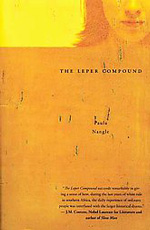

Bellevue Literary Press, paperback, 1934137065
In The Leper Compound, Paula Nangle draws from her childhood spent in southern Africa and her experiences as a psychiatric nurse to craft this insightful debut novel about pre- and postcolonial Zimbabwe and South Africa. The story traces a European girl's maturation to adulthood, compounded by her shifting sense of identity and belonging, and illnesses that affect both her and those who are closest to her.
The novel opens in Rhodesia in the late 1960s, as Colleen is felled by a severe case of malaria, the illness that recently claimed her mother's life. She recuperates at home with her father, who owns a nearby coffee farm, and her younger sister, whose increasingly odd behaviors at boarding school are worrisome to her teachers. Colleen's slower than expected recovery is complicated by her empathy towards a dying African schoolteacher, disturbingly realistic dreams about death, and her sense of guilt for not being a true African, as she views herself as a thief of its culture and a beneficiary of white privilege.
During her teenage years, the Second Chimurenga takes place, and guerrillas threaten the colonial government and farmers. Colleen aligns with the freedom fighters in opposition to her father and other local whites, and in support of an African classmate who is her first love. She leaves Rhodesia to become a nurse in South Africa, and as that country's racial strife worsens the new nation of Zimbabwe emerges from the efforts of the independence movements in Rhodesia. Colleen becomes a community health nurse in South Africa, marries, and bears a son afflicted with a life threatening congenital condition that tests her resolve, sanity, and the strength of her marriage.
The chapters in The Leper Compound move back and forth in time, with nightmares and dream-like sequences that are occasionally confusing to Colleen. I found Nangle's poetic use of language throughout the book to be entrancing, but at the same time it served to distance me from its supporting characters, and its overall emotional impact was dampened as a result. Several sections stood out from the others, particularly Colleen’s experience in caring for a patient who had just died, and her son’s hospitalization, which were exceptional and unforgettable.
The Leper Compound is a promising first effort, one which is best savored slowly rather than rushed through
at a single reading. It provides a unique and interesting perspective on the last days of white rule in southern
Africa, as told through the life of a sensitive and caring healer.
